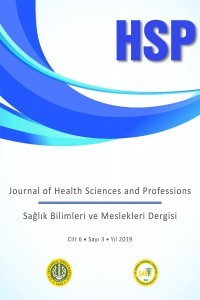Kanser Hastalarında Hastalık Algısının Değerlendirilmesi
Hastalık algısı, hemşire, kanser
-
Illness perceptions, nurse, cancer,
___
- Leventhal H, Leventhal EA, Cameron L. Representations, procedures, andaffect in illness
- cognitive model. In: Baum A, Revenson TA, Singer JE, editors. Handbook of health psychology. Mahwah: Lawrence Erlbaum; 2001. p.19-48.
- Armay Z, Özkan M, Kocaman N, Özkan S. Hastalık algısının ölçeğinin kanser hastalarında Türkçe geçerlik ve güvenirlik çalışması. [The Turkish reliability and validity study in cancer patients of illness perception questionnaire] Klinik Psikiyatri [Clinical Psychiatry] 2007;10:192-200.
- Petrie JK, Weinman J. Why illness perceptions 6(6):536–539.
- Petrie JK, Jago AL, Devhich DA. The role of illness perceptions in patients with medical conditions. Current Opinion in Psychiatry 2007;20(2):163–167.
- Hagger MS, Orbell S. A meta-analytic review of the common-sense model of illness 2003;18(2):141-84.
- Weinman J, Petrie KJ, Moss-Morris R, Horne
- Questionnaire: A new method for assessing the cognitive representation of illness. Psychol Health 1996;11(3):431-445.
- Yeon Kye S, Young Park E, Oh K, Park K.Perceptions of cancer risk and cause of cancer risk in korean adults. Cancer Res Treat. 2014 Sep 1547(2): 158-165. Available from:
- http://www.ncbi.nlm.nih.gov/pubmed/2548 3748/DOI:10.4143/crt.2014.024.
- Tan M, Karabulutlu E. Social Support and hopelessness in Turkish patients with cancer. Cancer Nursing 2005;28(3):236- 240.
- Tuncay T. Genç Kanser Hastalarının Hastalık
- Yaklaşımı Temelinde Analizi [Analysis of the Illness Narratives of the Young Cancer Patients on the Basis of Empowerment Approach] Toplum ve Sosyal Hizmet [Community 2009;20(2):69-87.
- Traeger L, Penedo FJ, Gonzalez JS, Dahn JR, Lechner SC, Schneiderman N et al. Illness perceptions and emotional well- being in men treated for localized prostate cancer. Journal of Psychosomatic Research 2009;67(5):389–397.
- Dempster M, McCorry KN, Brennan E, Donnelly M, Murray LJ, Jonston TB. Do changes in illness perceptions predict changes in psychological distress among oesophageal cancer survivors?Journal of Health Psychology 2010;16(3):500–509.
- Zıvkovic MV, Dediol I, Ljubicic I, Situm M. Sun behaviour patterns and perception of illness among melanoma patients. JEADV 2011 Jun 21;26(6):724- 729.Availablefrom:http://www.ncbi.nlm.ni
- h.gov/pubmed/21689168/
- 1111/j.1468-3083.2011.04154.x.
- McCorry KN, Dempster M,Quinn J,Hogg A, Newell J, Moore M et al. İllness perception clusters at diagnosis predict psychological distress among women with breast cancer at 6 months post diagnosis. Psycho-Oncology 2013;22(3):692–698.
- Scharloo M, Baatenburg de Jong RJ, Langeveld TPM, Velzen-Verkaik E, Akker MD, Kaptein AA. Illness cognitions in head and neck squamous cell carcinoma: predicting quality of life outcome. Support Care Cancer 2010;18(9):1137–1145.
- Iskandarsyah A, Klerk C, Suardi DR, Sadarjoen SS, Passchier J. Consulting a traditional healer and negative illness perceptions are associated with non- adherence to treatment in Indonesian women with breast cancer. Psycho- Oncology 2014;23(10):1118–1124.
- Castillo DA, Godoy-Izquierdo D, Vazquez ML, Godoy JF. İllness beliefs about cancer among healthy adults who have and have not lived with can cerpatients.
- Behavioral Medicine 2011 Dec;18(4):342- 351.
- http://www.ncbi.nlm.nih.gov/pubmed/2130 8426/DOI 10.1007/s12529-010-9141-6.
- Hopman P, Rijken M. İllness perceptions of cancer patients: relationships with illness characteristics and coping. Psycho-Oncology 2015; 24(19):11–18.
- Keeling M, Bambroıgh J, Simpson J. Depression, anxiety and positive affect in people diagnosed with low-grade tumours: the role of illness perceptions. Psycho- Oncology 2013;22(6):1421–1427.
- Richters A, Derks J, Husson O, Van Onna IE, Fossion LM, Kil PJ, et al. Effect of surgical magrin status after radical prostatectomy on health-related quality of life and illness perception in patients with prostate 2015;33(1):9-15.
- Kayır G. Onkoloji hastalarının hastalık algısı ve Stresle başa çıkma biçimleri [Disease perception of oncology patients and their ways to deal with stress] [Yüksek Lisans].
- Bilimleri Enstitüsü [Istanbul University Institute of Health Sciences] İstanbul, Türkiye, 2014.
- Kayış A. Kanser hastalarının hastalık algısı ve umutsuzluk düzeyleri [İllness perception and hopelessness levels in cancer patients] [Yüksek Lisans]. Haliç Üniversitesi Sağlık Bilimleri Enstitüsü [İnstitude of Medical Sciences, Haliç Üniversity], İstanbul, Türkiye, 2009.
- Kocaman N, Özkan M, Armay Z, Özkan S. Hastalık Algısı Ölçeğinin Türkçe uyarlamasının geçerlilik ve güvenilirlik çalışması. [The reliability and the validity study of Turkish adaptation of the revised Illness Perception Questionnaire] Anadolu Psikiyatri Dergisi [Anatolian Journal of Psychiatry] 2007;8(4):271-280. of from: cancer. Urologic
- Oncology İstanbul Üniversitesi Sağlık
- ISSN: 2148-7588
- Başlangıç: 2014
- Yayıncı: İstanbul Üniversitesi-Cerrahpaşa
Cerrahi Aydınlatılmış Onam Hakkında Hastaların Bilgi Düzeyinin İncelenmesi
Zeynep KARAMAN ÖZLÜ, Münevver KILIÇ, Ayşegül YAYLA
Ateş Şikayeti İle Acil Servise Getirilen Çocuklarda Ateş Olgularının Değerlendirilmesi
Özlem ÖZTÜRK, Aysel TOPAN, Tülay AYYILDIZ
Acil Tıp Kliniğinde İntiharlı Kardiyovasküler İlaç İntoksikasyonları
Harun AYHAN, Dogac ÖZÜÇELİK, Halil DOĞAN, Mehmet ERDOĞAN, Yavuz YİGİT
Primipar ve Multipar Gebelerde Doğum ve Postpartum Döneme İlişkin Endişelerin Belirlenmesi
Çocuklarda Prosedürel Ağrı Yönetiminde Dikkati Başka Yöne Çekme Yöntemlerinin Kullanımı
Bir Kadın Sağlığı Sorunu: Genital Mutilasyon
Genç Erişkinlerde Fiziksel Aktivite Düzeyi İle Vücut Kompozisyonu İlişkisi: Pilot Çalışma
Aysel YILDIZ, Devrim TARAKCI, Fatma KARANTAY MUTLUAY
Sıcak Basması İnanç Ölçeği’nin Geçerlilik ve Güvenilirlik Çalışması
